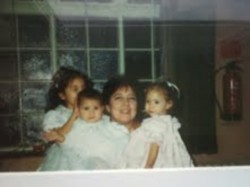Breast cancer first tore the Moss family apart fifteen years ago. Now the young sisters live in constant fear of being diagnosed themselves.
Their grandmother, Flora, passed away in 1995, just eight months after she’d been diagnosed with breast cancer.
“We were all relatively young when nana died. It was that sort of age where you don’t fully understand what’s happening, but you’re old enough to know that what is happening isn’t good,” says twenty-three-year-old Sophie, the eldest of the sisters.
The girls later found out that their aunt was also suffering from the same disease: “Our auntie Joan passed away about seven years after our nana. It was definitely a shock for it to happen all over again.
“We were so close to her and we literally had to sit back and watch the disease take her away,” says twenty-year-old Claire.
Almost 46,000 women are diagnosed with breast cancer each year in the UK, making it the most commonly diagnosed form of cancer.
With a history of breast cancer in the family, the sisters are aware that they are at almost double the risk of being diagnosed with the disease than those who don’t have a family history of the disease. However, the girls deal with the news in different ways.
Rebecca, 19, is the youngest and the one who finds it the hardest to accept the statistics: “I guess more than anything I find it scary to believe how at risk I am. I’m definitely scared of it. It’s the possibility of growing up, having a family, and then all of a sudden I find out I have this disease. It’s almost like a nightmare. One that I cannot predict and all I can do is wait and see what happens.”
Contrary to Rebecca’s view, Claire believes that there is nothing they can do, so there’s no point in living in fear: “Of course I hate the idea. I know that anyone at anytime can get cancer, but it’s worse knowing the odds are against us, because we’re constantly living in fear.
“It’s like there’s a rope tied around my waist and it’s slowly pulling me backwards. I don’t think anyone can understand it unless they are in a position like ours.”
The girls’ mother, Angie, has had more than six scares in the past ten years alone. Having been called back several times after routine mammograms the sisters have seen first-hand the effect of a scare.
“I remember my mum went for a routine check up. She has them more often because of the family history. A few weeks later she had a letter inviting her back for a second check-up. My mum’s a tough person, so when she asked me to go with her for her second checkup, I knew she was afraid. I don’t think I’ll forget the way she squeezed my hand when we were in the waiting room. I don’t think you can fake a fear like that,” Claire says.
The sisters know there is nothing that they can do to reverse their family medical history. However they do realise that they can’t live their life worrying about what might happen next.
Dr Caitlin Palframan from Breakthrough Breast Cancer says that although breast cancer is uncommon in women under the age of 40, and most men who are diagnosed are over 60, it is still important to check yourself regularly.
“It’s important that all women get into good habits of checking their breasts from early adulthood, since most cases of breast cancer are found by women noticing unusual changes, taking the initiative, and visiting their doctor,” Dr Palframan says.
She adds: “The earlier breast cancer is found, the better the chance of beating it.”
Men should also carry out regular checks, being aware of nipple discharge or ulceration, and any changes in the appearance and direction of the nipple: “Lumps are vital to look out for – but do not forget that there can be other important signs too. Even if you do find a lump, in most cases they turn out not to be cancerous.”
For more facts and advice on breast cancer, visit breakthrough.org.uk.
— To protect the privacy of the family in the article, all names have been changed.

